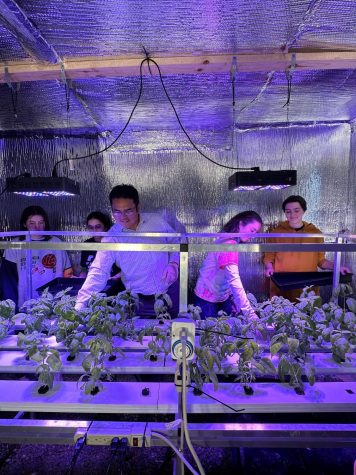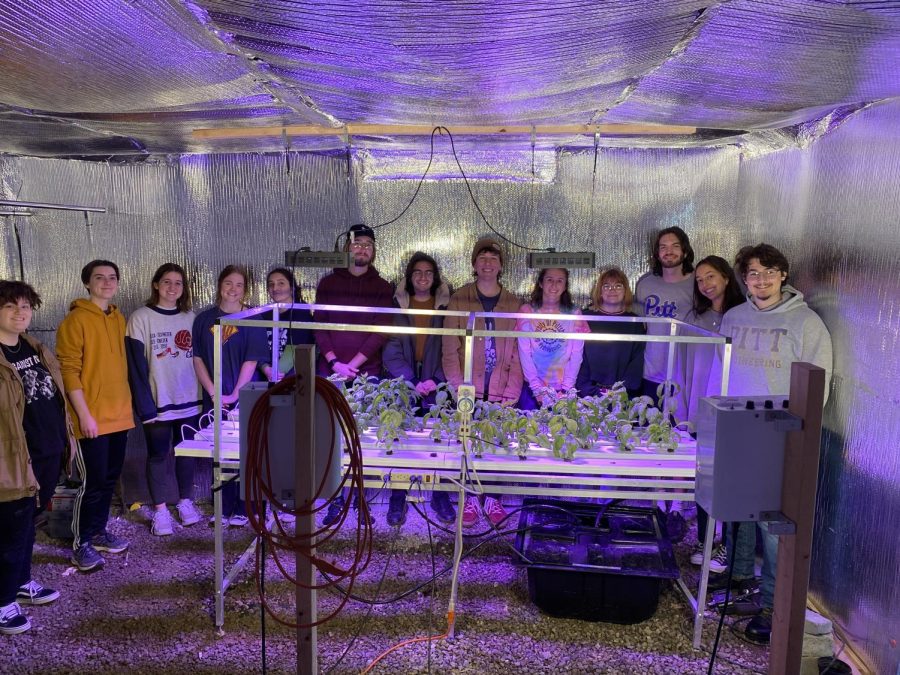‘Grow food anywhere’: Pitt Hydroponics works to make farming accessible
Pitt Hydroponics members.
January 13, 2023
Leah Roth’s interest in hydroponics first sparked during a high school Disney World trip where she rode “Living with the Land” at EPCOT — a boat cruise that takes its passengers past greenhouses while teaching them about the history of farming. Roth later discovered the hydroponics club during her first year at Pitt through a Resident Assistant in her building.
“I signed up because it sounded interesting and cool, and then I totally was into it for the next five years,” Roth, the president of Pitt Hydroponics, said.
Pitt Hydroponics is a club that builds and designs hydroponic systems and grows plants using those systems. According to Roth, a fifth-year environmental engineering major, hydroponics is a farming technique that involves growing plants without soil. To do this, Roth said, a person needs to add a nutrient base, made up of either chemicals or natural ingredient mixtures, to water. She said the plants sit above the water and nutrient mixture, but still come into contact with it, which is very different from traditional agricultural practices that involve soil.
“It’s also known as vertical farming because it can just go up instead of the normal across, like you would see in a typical farm set-up,” Roth said.
Matthew Brancaccio, a junior environmental engineering major, said hydroponic systems make farming more accessible, allowing people to grow plants and sustain themself without having land.
“Never in human history have people been able to just grow food anywhere,” Brancaccio said.
Steven Panico, a sophomore materials science major, said the vertical element of hydroponic farming allows people to grow the systems indoors and in dense urban environments where traditional farming is not always possible.
“When we’re growing these plants indoors you don’t have to worry about pesticides and such, so you don’t pollute the environment with those as much,” Panico said.
Panico said there are six main different types of hydroponic systems, but they are all generally made up of the same parts. According to Panico, tubing and a pump are used to bring the water and nutrient mixture up from a reservoir, which is then pumped into a different container where the plants are held.
“That water interacts with the roots of those plants that you have in the other container, and they get their nutrients from there,” Panico said. “That’s essentially the most basic form of a hydroponic system — water reservoir, pump, tubing and plants.”

According to Roth, the club works with an organization based in Pittsburgh’s Homewood neighborhood called The Oasis Project. She said they operate the club out of one of the Oasis Project’s buildings, where the club grows and harvests plants, such as basil and lettuce, which they then donate to the project to use in cooking classes.
“Homewood is a food desert which means that they don’t get any fresh produce in the area,” Roth said. “There’s none directly farmed there.
Roth also said the club recently held an event in collaboration with Pitt’s Active Minds organization where they built hydroponic systems out of water bottles and discussed the effects plants have on mental health.
“We’re looking to expand and collaborate with a bunch of clubs on food and how hydroponics is interesting, and how that can relate to multiple clubs and disciplines, even outside the typical engineering that you usually see,” Roth said. “We’re definitely trying to diversify the club and hydroponics as a whole.”
According to the National Library of Medicine, 95% of the body’s supply of the neurotransmitter serotonin is manufactured in a person’s intestines. Brancaccio said a healthy diet, which can be achieved through growing food at home with a hydroponic system, can also help improve mental health.
“If you have a really unhealthy diet, you will naturally not be able to be as happy as you can be,” Brancaccio said.
Through educating students about hydroponics and vertical farming, the club hopes to promote sustainability. Roth said the club meets biweekly on Tuesdays at 9 p.m. where they discuss what hydroponics is, its history, equipment needed, why it’s beneficial and more.
“We did a meeting where we had people pitch their own hydroponic systems from the club,” Roth said. “They came in with their own ideas, and we’re going to work [this] semester to actually bring them to life through the Makerspace at the University.”
Panico said the atmosphere of the club and the people in it make attending the biweekly meetings enjoyable and something he looks forward to.
“Everyone’s just so nice and happy,” Panico said. “I think having fostered that community and getting to see them every other week is my favorite part.”








